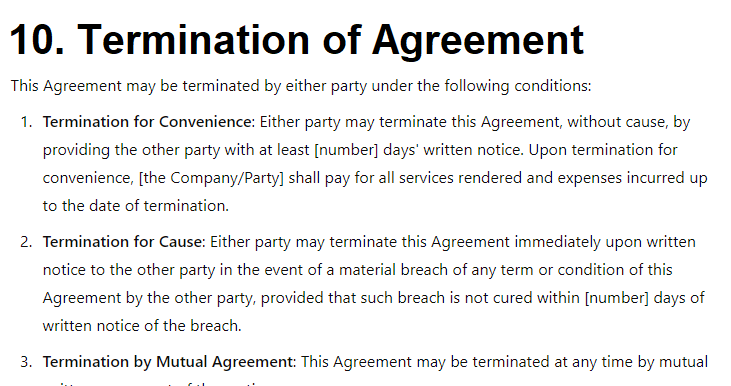Quick Summary
A termination clause in a contract specifies the conditions under which the agreement can be legally ended by either party. These clauses are essential as they define the circumstances that allow for termination without constituting a breach, thereby protecting parties from potential disputes. Common types of termination clauses include those based on performance failures, force majeure events, mutual convenience, or unilateral rights retained by one party. Including a well-defined termination clause ensures clarity, manages risks, and provides a structured exit strategy, safeguarding the interests of all parties involved.
Blog Content Overview
- 1 What is a Termination Clause?
- 2 Relevance of Termination Clauses in Contracts
- 3 Types of Termination Clauses in Contracts
- 4 Key Considerations When Drafting a Termination Clause
- 5 Termination Clauses in a Contract Examples
- 6 The Legal and Financial Implications of Contract Termination
- 7 How to Handle Contract Termination Effectively
- 8 Frequently Asked Questions (FAQs) on Termination Clauses in a Contract
The cornerstone of any commercial agreement is a contract that has been validly executed in writing. They are critical to business relationships and provide a legal framework that captures the rights and obligations of the signatory parties. Consequently, commercial contracts can be complex and with exhaustive detail, capturing the parties’ agreement on various issues that can arise in the contract lifecycle. Further to the parties’ intent, contracts that satisfy the requirements of the Indian Contract Act, 1872 are therefore binding and can be legally enforced through a court of law.
One key component of a contract is the termination clause, which outlines how and when the contract can be legally “ended”. These clauses are critical because they define the conditions under which a party can walk away from the binding nature of the contract, without breaching the terms thereof. Whether due to non-performance, changes in business needs, or unforeseen events, contracts may need to be terminated in the course of business and thus, having a clear termination clause in place protects a party from potential risks and ensures they are not locked into unfavorable situations.
Based on the nature of the commercial relationship between the parties, there are several types of termination clauses which can be agreed, each serving a unique purpose. Termination clauses can allow for a party to end the agreement if the other fails to meet their obligations or breaches the contract, or even for termination by both parties on the basis of mutual convenience. Understanding termination clauses in a contract helps businesses avoid disputes and protect their interests when a contract must end.
What is a Termination Clause?
A termination clause is a critical provision in a contract that outlines the conditions under which one or both parties can end the agreement before its natural conclusion. It specifies the events or circumstances that allow for contract termination and often includes guidelines on the notice period, reasons for termination, and any potential penalties or obligations upon termination. Typically, termination clauses do not automatically end all obligations between the parties, and certain legal provisions (such as governing law and dispute resolution) would survive the termination of the agreement.
Definition of a Termination Clause
A termination clause legally defines how a contractual relationship between parties can be ended, by setting out pre-defined terms and conditions to be satisfied such that the termination itself does not amount to a breach of the contract. Depending on the nature of the underlying commercial relationship, termination clauses can be linked to performance, force majeure conditions that render performance impossible, mutual convenience, or even a unilateral right retained by one party (such as in investment agreements).
Purpose of Including Termination Clauses in Contracts
The primary purpose of a termination clause is to offer clarity on how the parties can end their contractual relationship and (to the extent feasible) protection from any claims of breach. It safeguards both parties by:
- Managing Risks: Helps to limit financial or operational damages if the business relationship is no longer viable.
- Ensuring Flexibility: Provides a means to break the contractual binds if the conditions become unfavorable, without triggering a dispute for breach of contract.
- Defining Responsibilities: Clearly outlines post-termination duties, such as settling payments or returning property.
General Impact on Contractual Relationships
Termination clauses have a significant impact on contractual relationships by:
- Fostering Accountability: Parties are aware of the consequences of failing to meet contractual obligations, promoting a higher standard of performance.
- Reducing Uncertainty: Pre-defined termination conditions prevent conflicts, ensuring both sides know the terms of disengagement.
- Enabling Smooth Transitions: When included, these clauses ensure that relationships can end in a structured manner, reducing the risk of disputes.
Relevance of Termination Clauses in Contracts
Termination clauses play a vital role in ensuring clarity on how and when a contract can be legally ended, thus preventing misunderstandings and disputes.
How Termination Clauses Prevent Disputes
A well-structured termination clause helps prevent disputes by clearly outlining the conditions under which the contract can be terminated. By establishing specific scenarios such as non-performance, breach of contract, force majeure or for mutual agreement, both parties understand their rights and obligations, reducing the risk of legal battles. This clear guidance helps avoid confusion and ensures that the end of a contract is handled fairly and predictably.
Importance in Managing Risks and Obligations
Termination clauses are essential to manage risks in contracts. They protect both parties from being locked into unfavorable agreements or suffering financial losses due to unforeseen circumstances. For example, if one party fails to meet their obligations, the termination clause offers a legal avenue to separate from the commercial relationship without breaching the contract. This minimizes potential damage to the business, whether by way of financial loss or reputational harm.
Influence on Contract Flexibility and Exit Strategies
A termination clause provides much-needed flexibility in contracts by offering a clear exit strategy. Businesses can adjust or end their contractual relationships without fearing legal consequences, provided the termination aligns with the agreed-upon terms. This flexibility is crucial in dynamic business environments where conditions can change quickly, and the ability to terminate a contract allows companies to adapt without long-term obligations.
Types of Termination Clauses in Contracts
Termination clauses in contracts provide clear terms for ending an agreement, protecting both parties from legal issues. There are several types of termination clauses, each with specific purposes and implications. Here are the most common types:
a. Termination for Convenience
Explanation: This clause allows one party to terminate the contract without providing a specific reason or cause. It is often used to offer flexibility in long-term contracts.
Typical Usage: Commonly found in government contracts, large-scale business agreements, and long-term partnerships where conditions may change over time.
Benefits: Provides flexibility for businesses to exit a contract when needs or priorities shift, allowing them to avoid being bound to unfavorable terms.
Challenges: Can be misused, leading to one-sided terminations or potential unfair treatment of the other party, especially if compensation for early termination is not properly addressed.
b. Termination for Cause
Explanation: Triggered when one party fails to meet specific contractual obligations, such as a breach of terms, non-performance, material issues such as negligence, gross misconduct or fraud, or other agreed-upon criteria.
Examples: Common triggers include non-payment, failure to deliver goods or services, breach of confidentiality provisions, failure to satisfy the terms of an employment relationship.
Importance of Defining “Cause”: Clarity in what constitutes “cause” leading to a breach or failure is critical to avoid disputes. Vague definitions can lead to legal battles and delays in enforcing the termination.
Legal Implications: The party terminating the contract must prove that “cause” was present, leading to the breach. Proper documentation and a clear process for addressing the breach are essential to avoid litigation.
c. Termination by Mutual Agreement
Explanation: Both parties agree to end the contract on terms that are mutually acceptable, often because the agreement is no longer necessary or beneficial.
Common Use: This is frequently used when both parties realize the business relationship is no longer advantageous and prefer to part ways amicably. A common example of such a clause is often seen in investment agreements, where the parties will typically agree to terminate the contract basis mutual agreement in the event that certain conditions cannot be fulfilled.
Benefits: A simplified and non-contentious process that allows the parties quick solution and where the costs and complications of dispute resolution can be avoided.
d. Automatic Termination Clauses
Explanation: The contract terminates automatically when specific predefined events occur without the need for further action by either party.
Examples: These events may include the death of a party, the dissolution of a company, or the completion of the contract’s objectives/duration of the contract.
Importance of Defining Triggering Events: Clearly specifying the events that will lead to automatic termination is essential to prevent confusion or disputes over whether the contract has ended.
Benefits: Such clauses ensure that once the objective/term of the contract has been achieved/completed, the parties do not need to take further steps to record their intent to terminate their arrangement.
e. Termination Due to Force Majeure
Explanation: This clause allows the termination of a contract when unforeseen or uncontrollable events prevent one or both parties from fulfilling their obligations.
Common Events: Natural disasters, war, pandemics (such as COVID-19), or significant government actions that impact the performance of the contract itself, are typical triggers for force majeure.
Significance: Including a force majeure clause in contracts is crucial for managing risks during global crises. It allows parties to exit contracts without penalties when extraordinary events make performance impossible.
Key Considerations When Drafting a Termination Clause
When drafting a termination clause in a contract, several critical factors must be carefully considered to ensure clarity, legal enforceability, and risk management. Here are the key considerations:
Clarity in Defining the Grounds for Termination
One of the most important aspects is clearly outlining the specific grounds for termination. Whether it’s termination for cause, convenience, or due to force majeure, the conditions must be unambiguous to prevent disputes. Clearly defining terms such as “material breach” or “failure to perform” will help both parties understand when termination is justified.
Notice Periods Required Before Termination
Including a well-defined notice period is essential. This provides the other party with sufficient time to rectify the issue or prepare for the termination. The notice period can vary depending on the type of contract and the reason for termination (e.g., 30 days’ notice for termination for cause, which may or may not include a timeline to cure the breach, or immediate termination for mutual convenience).
Consequences of Termination
Termination can lead to various consequences that should be addressed within the clause:
- Compensation: Specify whether any financial compensation is due upon termination, particularly in cases of early termination.
- Return of Goods: Include provisions for the return of physical goods, assets, or property that were exchanged during the contract.
- Intellectual Property Rights: Clearly outline what happens to any intellectual property created or shared during the contract term.
Legal Enforceability and Compliance with Local Laws
It is vital to ensure that the termination clause complies with local laws and regulations, as termination rights can vary significantly across jurisdictions. Contracts must be legally enforceable in the applicable region to avoid issues in the event of a dispute. In India, this requires that the elements of a legally valid and binding contract as set out in the Indian Contract Act, 1872 must be satisfied.
Handling Disputes Arising from Termination
Even with a well-drafted termination clause, disputes can arise. This can typically be around the circumstances of the termination itself and consequently, provisions such as governing law and dispute resolution are deemed to survive the termination of the contract, in order to permit the parties to resolve the dispute and avoid prolonged legal battles.
Termination Clauses in a Contract Examples

Sample Image of Termination Clause
The Legal and Financial Implications of Contract Termination
Termination clauses in contracts come with significant legal and financial implications. Understanding these aspects is crucial to avoid costly disputes and ensure compliance with the terms of the agreement.
Legal Obligations of Both Parties After Termination
Once a contract is terminated, both parties have specific legal obligations they must fulfill. These may include the return of property, settling outstanding payments, or maintaining confidentiality. Failing to meet these obligations can result in legal action and penalties. It’s essential for contracts to outline post-termination duties clearly to ensure both parties comply with their legal responsibilities.
How Termination Clauses Impact Damages or Penalties
Termination clauses often address the potential for damages or penalties. For instance, if a party terminates the contract without meeting the agreed conditions, they may be liable for compensatory damages. Additionally, contracts may include penalty clauses for early or improper termination, which can lead to significant financial losses if not followed correctly. Clear language regarding these penalties helps mitigate financial risks and also aids in determining the liability of the parties vis-à-vis the termination of the contract.
Real-World Examples of Improper Termination Leading to Lawsuits or Financial Losses
Improper termination of contracts can lead to lawsuits, significant financial penalties, or reputational damage. For example, if a party terminates a contract without just cause or fails to follow the notice period, they can be sued for breach of contract. Real-world cases have shown that businesses that do not adhere to the terms of their termination clauses may face substantial financial losses, including compensating the other party for lost profits or operational disruption. This also presents a reputational risk, where the non-justifiable failure to honour the contract is seen as grounds for distrust in future dealings.
How to Handle Contract Termination Effectively
Handling contract termination effectively is essential for minimizing disruption to your business and maintaining good relationships with other parties. Here are key tips to ensure a smooth termination process:
To avoid potential pitfalls, businesses should follow a structured approach when terminating a contract. Begin by reviewing the termination clause to ensure all conditions are met. Provide the required notice to the other party and plan for any transitional measures to minimize operational disruptions. Clear communication throughout the process helps prevent misunderstandings and maintains professionalism.
Importance of Consulting Legal Experts Before Terminating
Consulting a legal expert is crucial before terminating any contract. Legal advisors can help ensure compliance with the termination clause and local laws, preventing unintended breaches or legal challenges. They can also assist in understanding the financial and legal implications, such as penalties, compensations, or intellectual property rights, safeguarding your business from unnecessary risks.
Documentation and Communication During the Termination Process
Proper documentation is essential when handling contract termination. All communications related to the termination should be documented, including notices, emails, and formal letters. This ensures that you have a record of compliance with the terms of the contract. Clear and timely communication with the other party is key to preventing disputes and ensuring that both sides understand their responsibilities during and after termination.
Ensuring Smooth Transitions for Parties Involved After Contract Ends
A well-planned transition ensures minimal disruption after the contract ends. This may involve transferring responsibilities, returning assets, or settling outstanding payments. Businesses should coordinate with the other party to ensure a seamless handover of any obligations. Setting a clear timeline for post-termination tasks helps to ensure that both parties fulfill their remaining duties without delay.
Termination clauses are an essential component of any contract, providing clarity and security for both parties involved. By defining the conditions under which a contract can be legally ended, these clauses help prevent disputes, manage risks, and offer flexibility in evolving business relationships. Whether it’s termination for convenience, cause, or due to unforeseen events, well-drafted termination clauses ensure that the rights and obligations of each party are protected, allowing for smooth transitions when the contractual relationship comes to an end.
Ultimately, the importance of termination clauses lies in their ability to safeguard businesses from legal and financial repercussions. By working with legal experts to craft clear and enforceable termination provisions, businesses can avoid costly litigation, protect intellectual property, and ensure compliance with local laws. In today’s dynamic business environment, termination clauses offer a crucial exit strategy that maintains the integrity of both the contract and the business relationship.
Frequently Asked Questions (FAQs) on Termination Clauses in a Contract
- What is a Termination Clause in a Contract?
A termination clause defines the conditions under which a contract can be ended by either party. It outlines the grounds for termination, the required notice period, and any consequences that may arise. - Why is a Termination Clause Important in a Contract?
A termination clause provides clarity and certainty for both parties, preventing disputes and ensuring that the contract can be ended legally and fairly if necessary. - What are the Most Common Grounds for Terminating a Contract?
Common grounds for termination include:- Breach of Contract: If one party fails to fulfill their obligations under the contract.
- Force Majeure: If an unforeseen event beyond the parties’ control makes it impossible to perform the contract.
- Material Adverse Change: If a significant event occurs that negatively impacts the contract’s viability.
- Insolvency: If one party becomes bankrupt or insolvent.
- Mutual Consent: If both parties agree to terminate the contract.
- What is a Notice Period in a Termination Clause?
A notice period specifies the amount of time one party must give the other before terminating the contract. - What are the Consequences of Terminating a Contract?
Consequences can vary depending on the specific circumstances, but they may include:- Payment of Termination Fees: If specified in the contract.
- Return of Property: If property was transferred under the contract.
- Confidentiality Obligations: If sensitive information was shared.
- Dispute Resolution: If there is a disagreement about termination.
- How Can a Termination Clause Protect Intellectual Property?
A termination clause can include provisions to protect intellectual property rights, such as ownership, confidentiality, and non-compete agreements. - What is a Survival Clause in a Termination Clause?
A survival clause specifies which provisions of the contract will continue to apply even after termination, such as confidentiality obligations or dispute resolution procedures. - How Can a Termination Clause Address Force Majeure Events?
A termination clause can define what constitutes a force majeure event and outline the steps that must be taken by the affected party to mitigate the impact. - When Should I Consult a Lawyer About a Termination Clause?
It’s always advisable to consult a lawyer when drafting or reviewing a contract, especially if the contract involves complex terms or significant financial stakes. - Can a Termination Clause Be Modified After the Contract is Signed?
Yes, similar to how any contractual provision can be amended, a termination clause can be modified through a written amendment to the contract, but this requires mutual agreement from both parties.
We Are Problem Solvers. And Take Accountability.
Related Posts

Succession Planning in Indian Family Businesses
Why 9 in 10 listed companies are family-controlled and why fewer than 2 in 3 have a plan to stay...
Learn More

How a Virtual CFO Gets Your Startup Series A Ready
From Messy Books to Term Sheet A deep-dive for seed-stage founders preparing for their first institutional raise. This report covers...
Learn More

Family Offices in India – The Insider’s Guide for India’s New Wealth Class
India's wealth is no longer just stored in family businesses and fixed deposits. By 2026, over 300 family offices will...
Learn More












